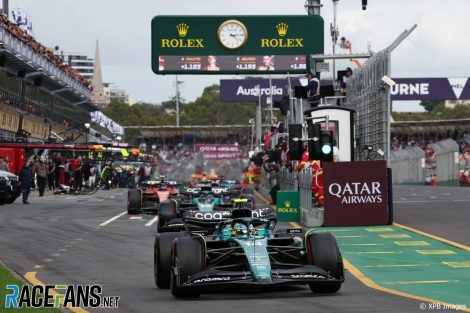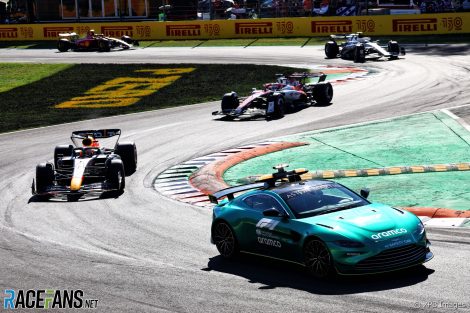Aston Martin has defended the FIA’s handling of the Australian Grand Prix following the controversial conclusion to the last round of the championship.
The race was red-flagged and restarted with two laps to go following Kevin Magnussen’s late retirement. Six drivers were involved in collisions at the standing restart, which led to a further red flag.
Following a lengthy delay a final restart was called but with only one lap remaining all the drivers could do was follow the Safety Car without overtaking. Some criticised the final lap as unnecessary, while others argued it was inappropriate to use a standing restart so late in the race.
Both Aston Martin drivers lost places at the standing restart. Fernando Alonso was hit by Carlos Sainz Jnr, while Lance Stroll skidded off at turn four. However as the FIA subsequently chose to reset the running order to the positions drivers held at the previous start – another decision which attracted criticism – both drivers were restored to their positions.

Aston Martin’s sporting director Andy Stevenson believes the FIA got every call right in Melbourne. “The Australian Grand Prix ended the only way it could have,” he told the team’s website. “It’s clearly written in the regulations.
“We had a conversation with race control before it all happened, to let them know what our understanding of the rules was, and they informed us of the decision they were going to make and that their interpretation of the rules was the same. There was a bit of uncertainty, but the FIA got it right.”
The FIA’s handling of late-race restarts has drawn criticism in recent years. A similar late standing restart was used at the Azerbaijan Grand Prix in 2021. But that year’s season finale ended in controversy when a rolling restart was used on the final tour without all drivers being allowed to re-join the lead lap – a rule-breaking call which influenced the outcome of the world championship.
Advert | Become a RaceFans supporter and
Last year’s Italian Grand Prix ended under Safety Car conditions due to a delay in the recovery of Daniel Ricciardo’s stricken McLaren, prompting some to ask why a standing restart was not used. Stevenson said the Australian Grand Prix showed the FIA has taken recent lessons on board.

“They’ve learned from things that have happened over the last few years and they managed the Australian Grand Prix extremely well,” he said. “They are the only ones with all the information and people need to remember that.
“None of the people who were disagreeing with the red flag in Australia had all information about the condition of the safety barriers, what was happening around the circuit, and where the safety vehicles and doctors were. No one did, except the FIA. We have to trust the FIA because they have all the information.”
Stevenson feels the FIA “can never win” with decisions such as these. “When the race goes well it’s because everyone else was great and when it goes wrong it’s because the FIA got it wrong.
“I feel for them, but it goes with the territory – they take on that responsibility and they handle it very well.”
Two of Aston Martin’s rivals formally objected to decisions made during the Australian Grand Prix. Ferrari tried to force a review of Sainz’s penalty for colliding with Alonso, and Haas protested the result of the race by claiming the FIA failed to correctly establish the running order ahead of the final restart. Both attempts to alter the result were rejected.
Advert | Become a RaceFans supporter and
At the previous race in Saudi Arabia, Aston Martin successfully overturned a penalty Alonso had been given. Stevenson said pressing cases such as this are “when I thrive.”

“Those moments are challenging but they’re right in my wheelhouse,” he said. “That’s when I can draw on all my knowledge and experience.
“You can call on past experiences and precedents that have been set. Every off-season I watch replays of races – endlessly. It drives my wife crazy, but I do it to remind myself of what’s happened and the precedents that have been set so I can be prepared for the challenging moments we’ll inevitably face in the season ahead. And, obviously, I do a lot of preparation with the sporting regulations – you have to know them inside-out.”
“You’ve got to pick your fights,” he added. “You can’t always be in the ear of the FIA. Sometimes decisions won’t go in your favour, but you’ve got to roll with it.
“When it’s fairly clear-cut or something that you’re going to gain from, that’s when you go in to fight your corner. You need to have every shred of information that will support your case ready to present to the FIA.
“You can never appeal a decision on a whim. If you start crying wolf, the FIA will never listen to you.”
Advert | Become a RaceFans supporter and



















